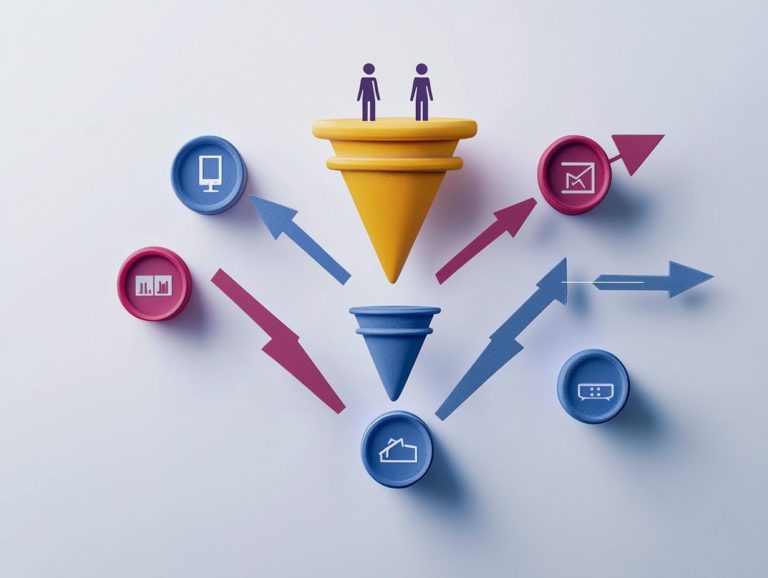Understanding Different Types of CRM Systems
Let's Set Up Your Lead Generation Strategy
Fill out the form below, and our team will get in touch with you to create a tailored solution for your business.
In today’s fast-paced business world, Customer Relationship Management (CRM) systems are essential. They help organizations improve customer interactions and streamline operations.
This article explores three types of CRM systems: Operational, Collaborative, and Analytical. Each is designed to meet your unique business needs.
You’ll learn about key features, advantages of adopting a CRM, and tips for selecting the best system. Whether you’re starting out or upgrading, this guide is filled with insights!
Contents
- Key Takeaways:
- Types of CRM Systems
- Let's Set Up Your Lead Generation Strategy
- Features and Functionality of CRM Systems
- Let's Set Up Your Lead Generation Strategy
- Benefits of Using a CRM System
- Let's Set Up Your Lead Generation Strategy
- Choosing the Right CRM System for Your Business
- Frequently Asked Questions
- Let's Set Up Your Lead Generation Strategy
Key Takeaways:

- Operational, collaborative, and analytical are the three main types of CRM systems, each with different features and functionalities.
- Implementing a CRM system can improve customer relationships, increase efficiency, and boost productivity.
- When choosing a CRM system for your business, consider factors such as budget, industry, and customization options before deciding on a specific system.
What is a CRM System?
A CRM system, or Customer Relationship Management software, is an invaluable tool for managing interactions with both current and potential customers. It centralizes data, enabling you to make informed decisions that elevate the customer experience. Many CRM solutions offer user-friendly interfaces that cater to both technical aficionados and those less inclined towards technology.
By harnessing operational, analytical, and collaborative features, CRM systems streamline your sales, marketing, and service processes while enhancing communication across your teams. This approach boosts customer satisfaction and drives your business growth!
Operational CRM is all about automating and refining your day-to-day customer interactions, allowing you and your team to efficiently track sales leads and manage customer service. On the other hand, analytical CRM dives deep into customer data, generating insights to help you fine-tune your strategies and improve your service offerings. Collaborative CRM integrates communication across departments, ensuring that all team members are in sync regarding customer interactions.
These interconnected components work seamlessly together, creating a robust foundation that not only boosts customer satisfaction but also supports sustainable long-term business growth. Integration with other software solutions can further enhance this effectiveness.
Types of CRM Systems
You’ll discover three primary types of CRM systems, each designed to meet the unique needs of your business and enhance customer interactions while boosting operational efficiency.
- Operational CRM, which is all about automating and managing your customer-facing processes—think sales, marketing, and service interactions.
- Analytical CRM, which dives deep into data, offering valuable insights and analytics that enable you to understand customer behavior and make informed decisions.
- Collaborative CRM shines a spotlight on communication and teamwork across various departments, ensuring a cohesive approach to customer engagement.
Each type plays a vital role in elevating your business strategy.
Operational CRM
Operational CRM is designed to make your customer-facing processes more efficient. It significantly boosts the effectiveness of your sales, marketing, and customer service teams.
It focuses on automation to reduce human error. This enhances overall performance.
With its robust functionalities, this system equips you with comprehensive tools for lead management. You can effectively track customer interactions across various channels. It automates essential workflows, enabling your teams to concentrate on building meaningful relationships instead of being weighed down by repetitive tasks.
Operational CRM also integrates valuable insights from customer data, enabling you to create tailored marketing campaigns that resonate more deeply with your target audience. By providing real-time access to customer information, it enhances your decision-making processes and ensures that your service teams can respond promptly to inquiries, fostering higher customer satisfaction and loyalty.
This strategic alignment of functions ultimately drives your business growth and strengthens customer engagement. The integration of cloud-based solutions can further enhance this alignment.
Let's Set Up Your Lead Generation Strategy
Fill out the form below, and our team will get in touch with you to create a tailored solution for your business.
Collaborative CRM
Collaborative CRM focuses on elevating communication and collaboration across various departments within your organization. It ensures a seamless flow of customer data and insights. By integrating information from multiple channels, these systems enable your teams to work together more efficiently, nurturing better customer relationships and enhancing service quality.
This interconnected approach not only streamlines workflows but also reduces the risk of data silos that can impede performance. With tools like shared dashboards and project management features, your teams can access real-time information, making it easier to coordinate efforts and respond swiftly to customer inquiries.
These tools help your teams collaborate easily, making communication seamless. Platforms such as HubSpot, Salesforce, and Zoho CRM exemplify this collaborative spirit, offering features like:
- Shared notes
- Task assignments
- Automated updates
As your teams gain visibility into customer interactions, they’ll be able to tailor their strategies more effectively. This leads to a unified and responsive service experience that significantly boosts customer satisfaction.
Analytical CRM

Analytical CRM is all about harnessing data and analytics to deliver actionable insights into your customers’ behaviors and preferences, enabling you to make informed decisions. By effectively analyzing customer interactions and engagement patterns, these systems empower you to fine-tune your marketing strategies and elevate the overall customer experience.
With features like predictive analytics (the ability to forecast future customer behaviors based on data trends), customer segmentation, and real-time reporting at your fingertips, you can anticipate customer trends and tailor your offerings with precision. For example, utilizing customer segmentation can help you pinpoint high-value clients. This enables you to launch targeted campaigns that resonate more deeply. Real-time reporting keeps you informed. Act fast to meet your customers’ needs!
By leveraging these analytical tools, you can cultivate deeper relationships with your clientele. This ultimately drives higher retention rates and enhances customer loyalty. Such analytics are invaluable for understanding and responding to your customers’ needs.
Features and Functionality of CRM Systems
CRM systems present a rich tapestry of features and functionalities meticulously crafted to elevate your user experience and optimize business processes. These systems encompass robust lead management tools, automation capabilities that simplify workflows, advanced reporting features that provide valuable insights, and user-friendly interfaces designed for both technical aficionados and those less inclined towards technology.
The customization options enable you to tailor your CRM system to align perfectly with your unique operational needs. This ensures maximum compatibility and efficiency. This level of personalization can significantly enhance the user experience.
Common Features
CRM systems have vital features like lead management, automation, reporting, and tracking. These tools enhance the efficiency of sales and marketing teams.
They enable you to monitor customer interactions, streamline communication, and optimize operations for an improved customer experience.
Lead management tools allow you to effectively capture and nurture potential customers, ensuring that no opportunity slips through the cracks. Setting up automatic tasks helps you schedule follow-up emails, reducing manual effort and minimizing the chance of human error.
Robust reporting functionalities provide valuable insights by analyzing customer data. This facilitates informed decisions that align with customer needs.
Collectively, these features foster better engagement with customers and drive operational efficiency. This allows you to cultivate long-lasting relationships and achieve your strategic objectives.
Let's Set Up Your Lead Generation Strategy
Fill out the form below, and our team will get in touch with you to create a tailored solution for your business.
Customization Options
Customization options in CRM systems let you tailor your customer relationship management processes to fit your specific operational requirements and business needs.
Whether it’s customizing workflows or integrating with other software, these options ensure that your CRM solutions align with your unique organizational goals and customer expectations.
By implementing tailored dashboards and reporting features, you can gain insights that reflect your performance metrics directly. Integration capabilities with platforms like email marketing or e-commerce solutions amplify data flow and enhance overall efficiency.
Adjusting workflows, such as setting up automatic tasks or segmenting leads based on specific criteria, allows your team to focus on nurturing relationships rather than drowning in process management.
This level of customization boosts productivity and elevates customer satisfaction through personalized interactions, ultimately driving higher retention rates and superior business outcomes.
Benefits of Using a CRM System
Discover the incredible advantages a CRM system can offer your business, especially in nurturing customer relationships, enhancing efficiency, and boosting productivity.
By centralizing customer data and automating routine tasks, a CRM system enables your team to concentrate on forging stronger connections with customers. This not only streamlines processes but also amplifies profitability through effective lead management and personalized service delivery tailored to each client’s needs.
Improved Customer Relationships

One of the standout advantages of using a CRM system is the significant enhancement of customer relationships through improved personalization and communication.
By harnessing customer data and insights, you can tailor your interactions and service offerings to align perfectly with individual customer needs. This approach fosters deeper connections and cultivates increased loyalty.
When you analyze purchasing history, you’re able to suggest products that resonate with each customer, significantly boosting your chances of making a sale.
The effective communication channels within the CRM enable you to respond promptly to inquiries or concerns, building trust and satisfaction.
With features that automate follow-ups and reminders, you can ensure that no customer ever feels overlooked. These strategies elevate the overall customer experience and encourage repeat business, demonstrating that investing in CRM technology truly pays off in the realm of relationship-building and enhances customer retention.
Increased Efficiency and Productivity
CRM systems significantly enhance your efficiency and productivity by automating routine tasks and streamlining workflows. This allows your sales, marketing, and customer service teams to focus on strategic initiatives and customer engagement instead of administrative duties.
By using smart automation tools, you can generate reports, schedule follow-ups, and manage customer interactions without constant manual oversight. This cultivates a more organized approach to managing client relationships and enables your teams to collaborate effectively and respond quickly to customer needs.
Let's Set Up Your Lead Generation Strategy
Fill out the form below, and our team will get in touch with you to create a tailored solution for your business.
As a result, your organization will experience improved team performance, leading to faster decision-making and enhanced customer satisfaction. Ultimately, these systematic improvements translate into better business outcomes, allowing you to allocate resources more efficiently and drive growth in a competitive market.
Choosing the Right CRM System for Your Business
Selecting the ideal CRM software for your operational needs is essential for enhancing customer relationships.
Consider key factors such as how well it integrates with your existing systems, the specific features you need, and the level of support vendors offer during the implementation phase, including security measures and customization options.
Each of these elements plays a significant role in ensuring that the CRM solution fits seamlessly into your workflow and boosts overall efficiency and customer engagement.
Factors to Consider
When choosing a CRM system, consider several key factors to ensure it aligns with your business objectives. Start by evaluating the necessary features, the system’s compatibility with your existing tools, how easy it is to integrate, and the level of vendor support available during and after implementation.
Prioritize the features that matter most to you—think automation, reporting, or customer engagement tools. Also, assess how potential systems will mesh with the software you already use; seamless integration can significantly boost your productivity.
Don’t overlook the vendor’s track record for ongoing support and training, as this could make or break user adoption! A comprehensive evaluation process may include demos, feedback from current users, and trials, ensuring that the CRM you choose meets your current requirements and has the flexibility to adapt as your business evolves.
Popular CRM Systems on the Market
Some of the most popular CRM systems available today include HubSpot, Salesforce, Zoho CRM, Copper, and Monday.com. Each offers a unique blend of features tailored to meet diverse business needs. These platforms provide essential solutions for lead management, customer tracking, and automation, catering to various industries and company sizes.
For instance, HubSpot shines with its user-friendly interface, making it an excellent fit for smaller businesses seeking a straightforward way to manage customer relationships. Conversely, Salesforce is celebrated for its robust customizability, ideal for larger enterprises that demand comprehensive solutions.
If you’re budget-conscious, Zoho CRM might catch your eye with its impressive array of tools at competitive prices. Copper, on the other hand, integrates seamlessly with Google Workspace, making it perfect for teams already using that ecosystem. Lastly, Monday.com stands out with its visually appealing project management functionalities, enabling you to track interactions alongside your sales activities.
Together, these platforms illustrate the diverse options available, ensuring you can find a CRM solution that aligns perfectly with your operational goals. Don’t forget to explore cloud-based alternatives!
Watch the video above to learn more about CRM systems and how they can benefit your business.
Frequently Asked Questions

What are the different types of CRM systems available?
There are three main types of CRM systems: operational, analytical, and collaborative. Each serves a unique purpose with its own features and benefits.
Let's Set Up Your Lead Generation Strategy
Fill out the form below, and our team will get in touch with you to create a tailored solution for your business.
What’s the difference between operational, analytical, and collaborative CRM systems?
Operational CRM systems manage customer interactions and data. Analytical CRM systems analyze this data for valuable insights, while collaborative CRM systems boost communication with customers, enhancing their overall experience.
Which CRM system is best for my business?
The best CRM system depends on your specific needs. For instance, operational CRM is perfect for businesses with large customer bases.
On the other hand, analytical CRM suits data-driven companies, while collaborative CRM benefits those focused on strong customer relationships.
What key features should I look for in a CRM system?
Important features include contact management, lead tracking, sales forecasting, customer service management, and data analysis. Identify your business’s specific needs to choose the right CRM.
Are there industry-specific CRM systems?
Yes, many CRM systems cater to specific industries. For example, there are tailored systems for healthcare, retail, and financial services.
Can I integrate a CRM with other tools?
Absolutely! Most CRM systems integrate seamlessly with tools like email marketing, social media, and accounting software. This creates a more efficient workflow.





